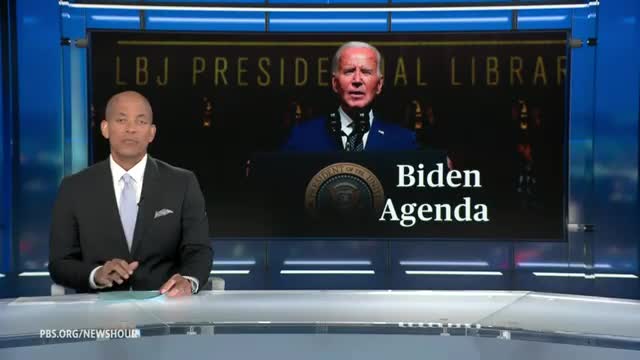Biden proposes sweeping reforms to restore faith in Supreme Court
This article was created by AI summarizing key points discussed. AI makes mistakes, so for full details and context, please refer to the video of the full meeting. Please report any errors so we can fix them. Report an error »

President Biden has unveiled a series of proposed reforms aimed at addressing ongoing legal, ethical, and political controversies surrounding the U.S. Supreme Court. Speaking at an event in Austin, Texas, he emphasized the need to protect civil rights, prevent presidential power abuse, and restore faith in the judiciary.
The proposed reforms include the introduction of term limits for Supreme Court justices, a binding code of conduct, and a constitutional amendment to eliminate presidential immunity from prosecution for crimes committed while in office. Under the term limit proposal, justices would serve 18-year terms, allowing a president to appoint a new justice every two years. The code of conduct would require justices to recuse themselves from cases involving financial or other conflicts of interest.
These proposals come in response to a Supreme Court ruling affirming presidential immunity for official acts, and they reflect a growing demand for accountability within the judiciary. However, the political feasibility of these reforms remains uncertain. House Speaker Mike Johnson has stated that the proposals would be \"dead on arrival\" in the House, and passing them would require significant bipartisan support, including a two-thirds majority in both chambers of Congress and ratification by three-quarters of state legislatures.
The timing of Biden's announcement is notable, as it coincides with an election year and reflects pressure from progressive factions within the Democratic Party. While Biden had previously resisted calls for Supreme Court reform, the current political climate has prompted him to rally support among his base. Vice President Kamala Harris has also endorsed the reforms, asserting that they will help restore confidence in the court and strengthen democracy.
Despite the challenges ahead, there appears to be broader bipartisan support for term limits compared to more contentious proposals like court expansion. Legal experts, including former members of Biden's Supreme Court Reform Commission, have indicated that while court packing may not gain traction, there is a growing consensus on the need for ethical guidelines for justices.
The proposed reforms include the introduction of term limits for Supreme Court justices, a binding code of conduct, and a constitutional amendment to eliminate presidential immunity from prosecution for crimes committed while in office. Under the term limit proposal, justices would serve 18-year terms, allowing a president to appoint a new justice every two years. The code of conduct would require justices to recuse themselves from cases involving financial or other conflicts of interest.
These proposals come in response to a Supreme Court ruling affirming presidential immunity for official acts, and they reflect a growing demand for accountability within the judiciary. However, the political feasibility of these reforms remains uncertain. House Speaker Mike Johnson has stated that the proposals would be \"dead on arrival\" in the House, and passing them would require significant bipartisan support, including a two-thirds majority in both chambers of Congress and ratification by three-quarters of state legislatures.
The timing of Biden's announcement is notable, as it coincides with an election year and reflects pressure from progressive factions within the Democratic Party. While Biden had previously resisted calls for Supreme Court reform, the current political climate has prompted him to rally support among his base. Vice President Kamala Harris has also endorsed the reforms, asserting that they will help restore confidence in the court and strengthen democracy.
Despite the challenges ahead, there appears to be broader bipartisan support for term limits compared to more contentious proposals like court expansion. Legal experts, including former members of Biden's Supreme Court Reform Commission, have indicated that while court packing may not gain traction, there is a growing consensus on the need for ethical guidelines for justices.
View the Full Meeting & All Its Details
This article offers just a summary. Unlock complete video, transcripts, and insights as a Founder Member.
✓
Watch full, unedited meeting videos
✓
Search every word spoken in unlimited transcripts
✓
AI summaries & real-time alerts (all government levels)
✓
Permanent access to expanding government content
30-day money-back guarantee
